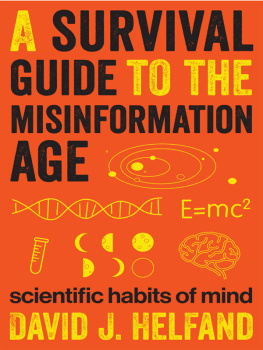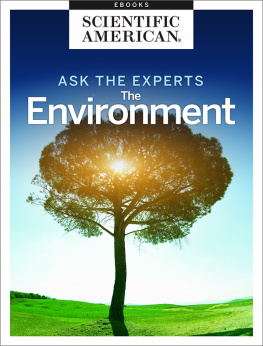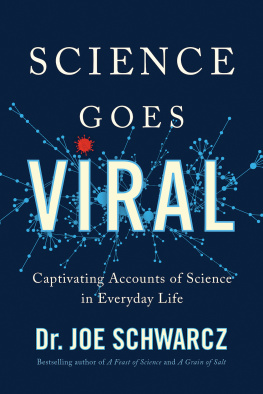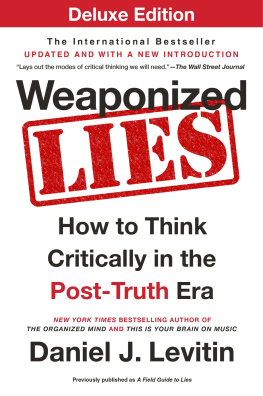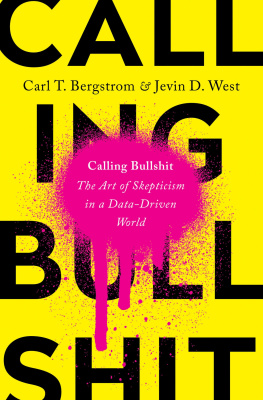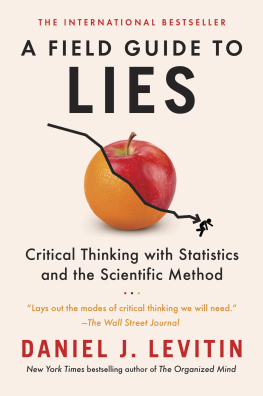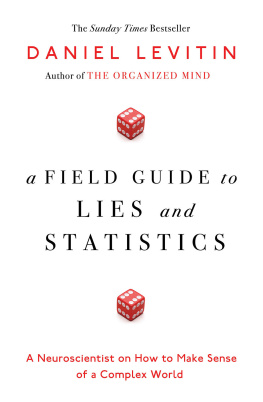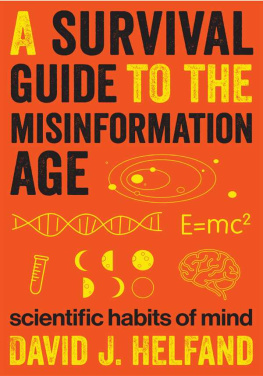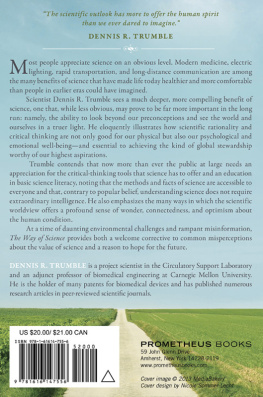A SURVIVAL
GUIDE TO THE
MISINFORMATION
AGE

DAVID J. HELFAND
A SURVIVAL
GUIDE TO THE
MISINFORMATION
AGE

scientific habits of mind
Columbia University Press New York
Columbia University Press
Publishers Since 1893
New York Chichester, West Sussex
cup.columbia.edu
Copyright 2016 David J. Helfand
All rights reserved
E-ISBN 978-0-231-54102-2
Library of Congress Cataloging-in-Publication Data
Helfand, D. J. (David J.), 1950
A survival guide to the misinformation age : scientific habits of mind / David J. Helfand.
pages cm
Includes bibliographical references and index.
ISBN 978-0-231-16872-4 (cloth : alk. paper) ISBN 978-0-231-54102-2 (ebook)
1. Errors, Scientific. 2. ScienceMethodology. 3. StatisticsMethodology. 4. Missing observations (Statistics) I. Title.
Q172.5.E77H45 2016
500dc23
2015034152
A Columbia University Press E-book.
CUP would be pleased to hear about your reading experience with this e-book at .
Jacket design by Alex Camlin
References to websites (URLs) were accurate at the time of writing. Neither the author nor Columbia University Press is responsible for URLs that may have expired or changed since the manuscript was prepared.
CONTENTS
F or nearly a century, the undergraduate college of Columbia University has required all first- and second-year students to engage in discussion and contemplation of some of the great ideas that Western Civilization has produced. For most of that period, the seminal works for these courses have been drawn exclusively from the humanistic tradition. Since 1937, Columbias Core Curriculum has consisted of seven courses that cover the intellectual and cultural history of the West through the study of literature, political philosophy, music, and art. Although the Core was described as the intellectual coats of arms of the university, science and mathematics were absent. In 1982, I chaired a committee that recommended this lacuna be rectified by adding to the Core a course in science. Twenty-two years later, in the universitys 250th year, Frontiers of Science was launched as a class required of all first-year Columbia College students. In 2013, the idea that science should become a permanent component of the Core Curriculum was formally adopted.
Unlike most general education and introductory-level university science courses, Frontiers of Science was not designed to impart to our students large quantities of information about a particular scientific fieldthe products of scientific inquiry. Rather, the point was to use examples drawn from a number of disciplines to illustrate what science is and how it produces our understanding of the material universe. I developed a brief, online text called Scientific Habits of Mind in conjunction with Frontiers of Science as an introduction to the distinct modes of thought that scientists use in producing their unique and powerful models of the world. Habits form the core of this book.
Over the thirty-eight years I have taught at Columbia, the College has vastly expanded its applicant pool and has significantly improved its selectivity. Yet I have found that among the students now arriving on campus, preparation in basic quantitative reasoning skills has declined at an alarming rate. In the 1970s, many of our students had not taken calculus in high school; now the vast majority of those we admit have had at least one calculus course. But their ability to use numbers, read graphs, understand basic probability, and distinguish sense from nonsense has declined. And in the larger populationamong politicians, journalists, doctors, bureaucrats, and votersthe ability to reason quantitatively has largely vanished. This is scary.
We live in a world dominated by science and its product: technology. This world faces daunting challengesfrom energy supplies to food supplies, from biodiversity collapse to the freshwater crisis, and, at the root of many of these issues, global climate change. Yet we shrink from confronting these challenges because we dont like numbers and are more comfortable with beliefs than with rational thought.
Faith will not quell the increasing demands humans place on the Earths resources. New Age thinking will not produce sustainable development. It is not clear that any philosophy will allow this planet to sustain a population of ten billion people in the manner to which contemporary Western societies have become accustomed. But it is clear that, to assess the limits the Earth imposes, to contemplate rationally what routes we might take, and to plan a future free from war and want, quantitative reasoning must be employed. Blind faithin God during the Middle Ages, in creativity during the Renaissance, in reason during the Enlightenment, and in technology todayis a shibboleth. It is a fantasy ungrounded from a rational assessment, in quantitative terms, of what is possible and what is not.
This book seeks to provide a set of tools to be used in promoting a rational and attainable future for humankind. It offers no formula for financial success or any promise of a sleeker physique. Rather, its goals are to cultivate rational habits of mind and to provide warnings against those who would pervert this uniquely human capacity so that our species might accommodate itself to the web of life that has been evolving here for 3.8 billion yearsto allow that life, and the fragile intelligence it has produced, to remain a lasting feature of our planet.
I arrived at Amherst College in the autumn of 1968 fully intending to major in theater studies. My wife, an accomplished actress on Broadway and television, assures me now that my continued pursuit of that path would have led to a lifetime of waiting tables. Thus, my first acknowledgment goes to the late Professor Waltraut Seitter for redirecting me toward astrophysics. I wasnt averse to science in school, but I didnt see how anyone could love it. Professor Seitter showed me the way. The first woman to obtain a chair in astronomy in Germany, Professor Seitter was teaching at Smith College in 1969 when I accidentally encountered her in a class I never planned on taking. Such is the role of serendipity in life, and I am grateful for it.
My physics and astronomy professors at Amherst (Joel Gordon, Bob Romer, George Greenstein, and Skip Dempseywhom I was delighted to encounter recently at one of my public lectures) built my foundation in science. My many graduate mentors at the University of Massachusetts ingrained in me the habits of mind that have served me well and form the basis of this book; most noteworthy are my undergraduate thesis advisor Dick Manchester and PhD supervisor Joe Taylor.
Colleagues at Columbia and astronomical collaborators from around the world too numerous to mention here have, over the past four decades, also helped to shape my views of science. Those who participated in my quixotic quest to add science to Columbias Core Curriculum, the ultimate stimulus for this book, however, deserve special thanks. Dean Bob Pollack was steadfast in championing this idea through more than one failed attempt, and Provost Jonathan Cole provided key support fifteen years ago when the latest push finally came to fruition. That would not have happened without my compatriots Jacqueline van Gorkom and Darcy Kelley, who were the earliest participants, or without the many faculty from diverse departments who agreed to join the enterprise: Don Hood, Nick Christie-Blick, Don Melnick, Wally Broecker, and Horst Stormer deserve special mention. Elina Yuffa has been holding the course together since its inception, and the first short, online version of this text would never have been completed without the tireless work of Ryan Kelsey at the Columbia Center for New Media Teaching and Learning and the creative assistance of Eve Armstrong, some of whose words and images remain in the boxes and endnotes of this volume. Special thanksand absolution from any errors that may have crept into is owed to Columbia statistician Dan Rabinowitz, who greatly clarified some of my amateur statistical reasoning. Quest students Morgaine Trine, Annie Borch, and Camilo Romero were invaluable in the final push to complete the manuscript.

